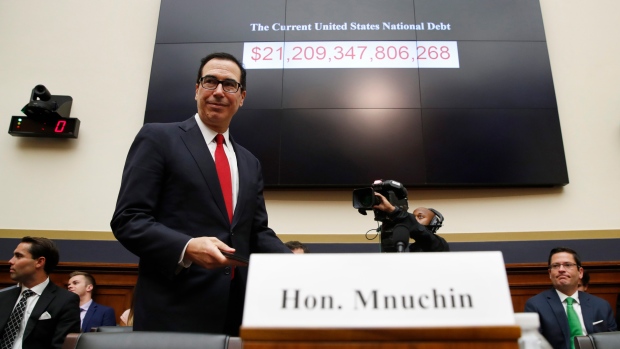Jul 12, 2018
Mnuchin seeks to calm fears of economic fallout from tariffs
, Bloomberg News

Treasury Secretary Steven Mnuchin said U.S. tariffs and retaliation by major trading partners haven’t dented the domestic economy, as he sought to calm fears from Republicans in Congress that a trade war is hurting American consumers and companies.
Mnuchin, speaking before the House Financial Services panel on Thursday, said he and administration officials are available for talks with China over trade. He called the measures modest in size and aimed at leveling the playing field for American industries.
“We put a modest amount of tariffs on China,” as a result of their policy of forced technology transfers, and then China retaliated, Mnuchin told the House Financial Services Committee on Thursday in Washington. The administration is monitoring the economic effect of those tariffs, including on uncertainty for businesses, and it hasn’t yet found “any negative impact.”
Chinese and U.S. officials have raised the prospect of resuming stalled talks over trade between the two nations after President Donald Trump ratcheted up the pressure by announcing this week a huge new round of potential tariffs.
“To the extent to that China wants to make structural changes, I and the administration are available,” Mnuchin said on Thursday.
'WE SHOULD TALK'
After the U.S. unveiled a list of Chinese imports worth US$200 billion that could face higher duties, China’s Vice Minister of Commerce Wang Shouwen said “when we have a trade problem, we should talk about it.” While that came amid fresh threats of retaliation from Beijing, it matches some willingness from the Trump team to resume talks at a high level, according to a person familiar with the administration’s thinking.
Communications between senior members of the Trump and Xi administrations have petered out since a third round of formal negotiations ended with scant signs of agreement in early June. The U.S. pushed ahead with a plan to slap 25 per cent tariffs on US$34 billion of Chinese imports last week, with plans for another US$16 billion to follow, spurring retaliation in kind from Beijing. Trump’s latest salvo threatens to push the trade fight into new territory, with China limited in using tariffs to push back. The government has, however, vowed to respond.
Washington and Beijing now have about seven weeks to strike a deal or dig in for a trade war that could upend corporate supply chains and raise prices for consumers around the world. The U.S. tariffs on US$200 billion of Chinese goods are scheduled to take effect after Aug. 30, when the Trump administration’s consultation process ends.
In the U.S., House Speaker Paul Ryan on Thursday drew a stark difference between his vision for trade and Trump’s, rejecting tariffs and warning that pulling out of trade agreements is a threat to the U.S. economy.
“We risk having American products locked out of new markets, jobs moved overseas, and a decline in American influence,” Ryan said at the Economic Club of Washington. “As our generals will tell you, these agreements are just as important for our national security as they are for our economy.”
